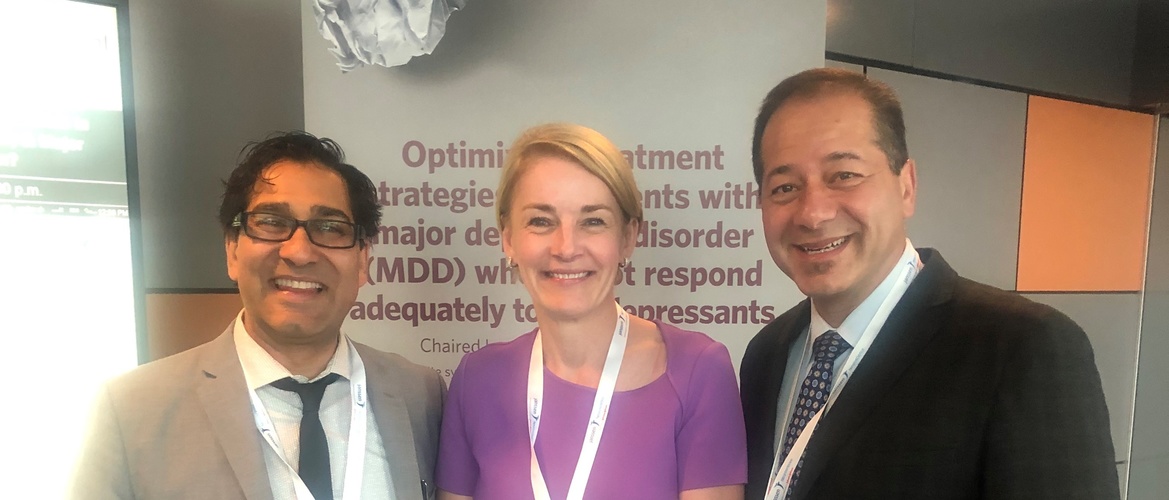
Vælg et område
Check de forskellige Progress in Mind indholdsområder.

Progress in Mind

Major depressive disorder (MDD) has significant costs to society and is predicted to be the leading cause of disability by 2030.1 Immediate recognition and early start of treatment of depression is important to avoid worsening the clinical course. Lack of early improvement in MDD could be predictive of a failure to achieve response or remission.
An increasing duration of depression has a negative impact on patient outcomes; long periods of depression are associated with decreased likelihood of recovery, increased comorbidities, greater risk of relapse and impaired functioning2-6 said Assistant Professor Diane McIntosh, University of British Columbia, Vancouver, Canada in a satellite symposium at WFSBP in Vancouver, sponsored by H. Lundbeck A/S and Otsuka Pharmaceuticals.
Many patients remain on inadequate treatment for longer than recommended, which may cause feelings of frustration and damage the doctor-patient relationship.7,8
Many patients remain on inadequate treatment for longer than recommended, which may cause feelings of frustration and damage the doctor-patient relationship.
Professor McIntosh highlighted a patient survey, showing that patients indicate that frustration with medication is primarily due to perceived lack of efficacy and side effects, which can lead to patients questioning their treatment regime, health care provider and ultimately affect treatment compliance.9
Evidence shows that when patients are involved in the decision making, decisions are better, health and health outcomes improve, and resources are allocated more efficiently. A shared decision-making process can involve two stages of discussion; firstly, discussing the initial preferences (the choices and options available), and secondly, a decision-making stage, in which the decision is made jointly by the patient and physician.10
Associate Professor Zahinoor Ismail, University of Calgary, Alberta, Canada presented data showing that the treatment goals in MDD change with the phases of the illness.11-13 Further, patients often view their treatment in terms of goals that are personal and meaningful to them. These may relate to their social and family life, physical health, employment status, or living arrangements.14
Failure to achieve an adequate response or remission is common despite sufficient availability of different classes of antidepressants.
Despite improvements in safety and tolerability, overall response rates to antidepressant treatment have not improved over the past three decades, with many patients failing to achieve adequate response or remission despite sufficient availability of different classes of antidepressants.15,16 Further, functional impairing symptoms, such as fatigue, sleep/wake disturbance and cognitive dysfunction may persist even when the patient is in remission or recovery17 , and patients with inadequate response to treatment experience significant impairments in social functioning. Professor Ismail ended his talk by concluding that there is still a need for additional treatments for MDD.18
Professor McIntosh provided an overview of existing and emerging therapies addressing inadequate antidepressant response on behalf of Professor Leslie Citrome, New York Medical College, Valhalla, New York, USA.
Neurobiological substrates of depression may go beyond monoaminergic circuits, which to date have been the main targets for antidepressant drugs. Persistent or residual symptoms are common in patients with MDD despite being in remission, and they increase the risk for suicide, relapse and have adverse effects on psychosocial and occupational functioning.19-21
Glutamatergic agents have shown promise in treatment of MDD, displaying rapid onset of antidepressant effect. An enantiomer of an NMDA-receptor antagonist, in a nasal spray formulation to be administered in a healthcare setting, is the first approved non-monoaminergic therapy, indicated for treatment-resistant depression.
The mode of action of NMDA-receptor antagonists may also involve the opioid system. However, opioid agents e.g. combining partial μ-opioid receptor agonism and ĸ- opioid receptor antagonist with μ-opioid antagonism have also been investigated in treatment of MDD but so far remain unproven. The same goes for an NMDA receptor modulator, acting as a glycine partial agonist, which recently failed in phase 3 trials.
GABA-ergic agents are also being investigated; one, an infusion product with positive allosteric modulator (PAM) properties of the GABA-A receptor, has been approved for post-partum depression.
At present, the only oral adjunctive agents approved for the management of MDD have been in the atypical antipsychotic medication class, with dopamine D2 receptor antagonist or partial agonist effects.
Professor McIntosh concluded by stating that at present, the only oral adjunctive agents approved for the management of MDD have been in the atypical antipsychotic medication class, with dopamine D2 receptor antagonist or partial agonist effects.
This notion was echoed by Gustavo Alva, ATP Clinical Research, Costa Mesa, California, USA. In addition to discussing data from the development programs of e.g. the NMDA-receptor antagonist enantiomer and the GABA-A receptor PAM, Professor Alva presented short- and long-term safety and efficacy data from clinical trials of adjunctive D2 receptor partial agonists, highlighting their place in the treatment of MDD.
This satellite symposium was sponsored by H. Lundbeck A/S and Otsuka Pharmaceutical Development and Commercialization, Inc.
Our correspondent’s highlights from the symposium are meant as a fair representation of the scientific content presented. The views and opinions expressed on this page do not necessarily reflect those of Otsuka and Lundbeck.